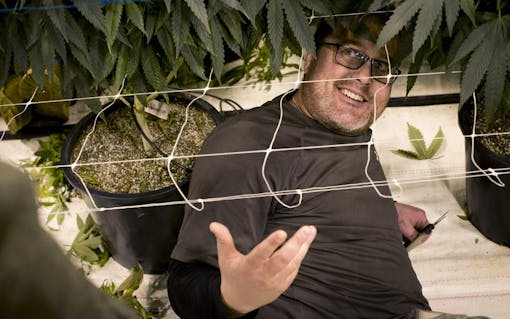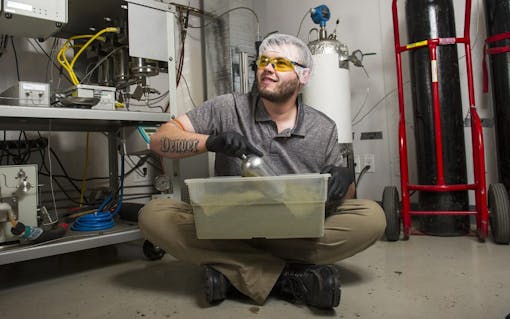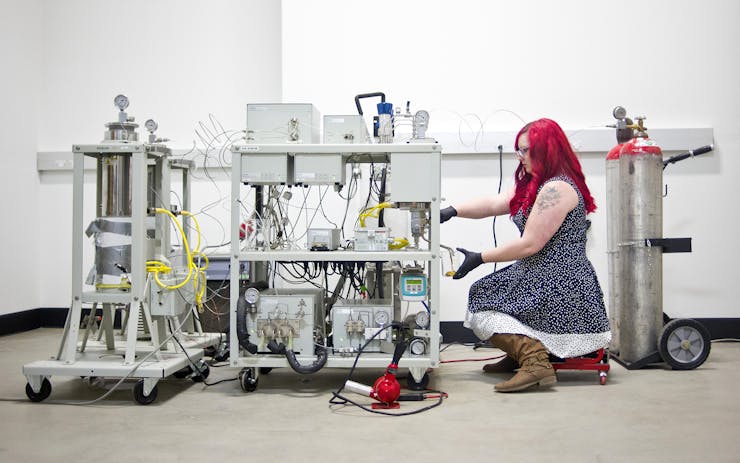Editor’s note: Check out Leafly’s 2019 version of our Legal Jobs Count, which provides a state-by-state breakdown of the 211,000 full-time jobs the legal cannabis industry has created in America.
Read Leafly’s 2019 Legal Jobs Report
Nick Boppe: Head grower

Nick Boppe is the head grower at Buddy Boy Farm located about 30 miles from Spokane, Wash. Boppe, 37, is in his second year at the 600 acre organic farm. Boppe moved to Eastern Wash. to work at Buddy Boy from Calif. where he was in construction. (Jed Conklin for Leafly)
After a couple decades as an itinerant construction worker, Nick Boppe values his job as head grower for Buddy Boy Farm in eastern Washington for its steady paycheck and the chance to work outdoors.
“As a guy who grew up in the Pacific Northwest, I’m an outdoors person and I find a lot more enjoyment out of the whole farming aspect,” said Bopp, 37.
Born in Sandpoint, Idaho, Bopp earned a fine arts degree from the University of Montana and embarked on nearly two decades of construction and landscaping work, mostly in California.
“I was living down in the Sierras, building houses for folks who had medical marijuana cards that allowed them to grow their own,” he said. “I built some greenhouses and helped some other folks get their gardens sited and equipped.”
Bopp found himself increasingly attracted to the cannabis culture. “I feel like I’m pioneering a trail with this stuff, and I couldn’t find that in too many other things in life,” he said.
Two years ago Bopp was hired as head grower at Buddy Boy Farm. The 600-acre agricultural business, founded by Steve Walser more than 40 years ago, added cannabis to its line of organic produce a few years ago. Today more than 100 varieties of cannabis, grown indoors and out, complement fields of organic blueberries, fruit trees, vegetable and alfalfa.
“The infrastructure behind one of these places is pretty overwhelming once you get down to it,” he said. “It’s similar to most other types of growing , watching for pests, fungi and molds, making sure all your ducks are in row. The temperature, humidity, air flow inside or outside – you have to pay attention so the end product turns out the best it can.”
Bopp said he also enjoys the camaraderie and exposure to people from all walks of like.
“It’s awesome to work with all these different people,” he said. “It’s why I do it, not just the growing itself. The salesmen, electricians, plumbers, growers. We have five women in our packaging department who speak Russian to each other all day.”
Buddy Boy Farm currently packages buds, grams ounces and has started to work with an oil extractor. “We’re busy here,” Bopp said. “The goal is positive and everyone is working toward it. When we show up each day here, we’re actually going for something: success—not necessarily money—but to be able to compete and be among the top five producers in the state.”
Justin Walker: Cannatourism entrepreneur

My 420 Tours CEO JJ Walker, left, and COO Danny Schaefer pose for a picture Thursday, Dec. 29 2016 on a transportation bus outside their office in Denver, CO. The two started operating a cannabis tourism experience in April 2013. Tours involve visits to grow houses, dispensaries, or a sushi, sake and joint rolling class. (Daniel Brenner for Leafly)
In 2013, event planner Justin “JJ” Walker sensed a big opportunity looming. “4/20 celebrations were growing in Denver,” said Walker, 36. “I knew that in 2014, the first year of legal weed, it would explode.”
Shop highly rated dispensaries near you
Showing you dispensaries nearHe studied the laws set to kick in on Jan. 1, 2014. Tourists would have access to legal cannabis–up to a quarter-ounce per day–but no place to partake. The new law prohibited public consumption, and clean air laws meant hotels and restaurants couldn’t let guests smoke anything.
“We found the one downtown hotel with open-air balconies and talked the manager into allowing us to book all the rooms for 4/20 tourists,” he said.
Thus was born My420Tours, a company Walker co-founded with partner Danny Schaefer. Their website declares it “the first cannabis tourism company in North America.”
Sure enough, on April 20, 2014, tens of thousands of cannabis enthusiasts gathered in Denver’s Civic Center Park, a few blocks from the hotel. His venture was a success, he said, with a full hotel of guests smoking legal cannabis on their balconies.
The deal with the hotel only worked once.
“New management came in,” Walker recalled, “and the new guy said no.”
Walker and Schaefer found other partner hotels. Two years later, My420Tours has deals with eight Colorado hotels, some in downtown Denver, some in the Colorado ski resorts 90 minutes away. Guests book rooms through My420Tours. When they arrive they’re given “vape backpacks” that allow them to partake with no smoke and no laws broken.
The company also offers growhouse and dispensary tours, cannabis foodie tours, cannabis massage, cannabis-infused limo rides from the airport–even an all-inclusive cannabis vacation.
Asked if he’s ever heard from law enforcement or other authorities, Walker said, “Never, not even one phone call. We do everything above board.”
Chris Moder: Extraction tech

Extraction tech Chris Moder poses for a portrait Friday, Dec. 30 2016 at Dixie Elixirs in Denver, CO. He has worked for the company for six years and uses a “super critical CO2” method to separate cannabinoids. Moder explains the method is a clean, well-tested extraction process to obtain pure THC. “It’s what gives it power,” he said. “I used air to make that, high five!” (Daniel Brenner for Leafly)
Chris Moder started at Dixie Elixirs five years ago as an on-call temp. Now he runs one of their $200,000 cannabis oil extraction machines.
For Moder, 26, opportunity came in a phone call from his future sister-in-law, who worked as Dixie’s first chef. She knew of his interest in “the weed industry,” and it wasn’t hard to lure him from general studies at Red Rocks Community College in suburban Golden.
“I knew I needed to continue my education,” Moder said. “But this sounded like a decent start in a growing field.”
The detour from his studies began when a Dixie foreman asked if he could fold cardboard shipping boxes.
“I told him I could fold the hell out of boxes,” Moder recalled. His climb up the employment ladder began.
He went from packaging to working on recipes, melting down chocolate and adding cream to infused edibles.
“I became an assistant manager when I began infusing stuff myself,” Moder said. The chef mentored him in hands-on leadership skills, proper preparation, and sanitation.
When a position opened in Dixie’s lab, Moder lobbied for it and won the job. He was put in charge of new equipment, where he quickly learned to troubleshoot problems with the machinery.
The $200,000 Waters Supercritical Extractor uses liquid carbon dioxide to turn raw plant material into cannabis oil. “Just like a cloud releases rain, the oil falls out from the plant and is collected,” Moder said.
Despite nearly doubling his salary in his time at Dixie, Moder said he plans to return to college in the near future. He wants to get a two-year business degree, then pursue a bachelor degree at Colorado State University.
“When I started, the cannabis industry was the wild West,” Moder said. “It didn’t always attract the best crowd. But I realize now, as more people see an opportunity to evolve with this industry, I’m gonna need an education. After that, I see limitless opportunity.”
Crystal Hoffman: Cannabis oil extraction manager

Crystal Hoffman, general manager at GNT Oregon, reaches for a flask of cannabis oil at GNT’s extraction lab in Portland, Ore. at Friday, December 30, 2016. Hoffman relocated to Portland last February to open the 8,800-sqare foot facility, which is licensed to extract oil for use in O.PenVAPE cartridges and products. (Samuel Wilson for Leafly)
In 2016, Crystal Hoffman marked her fourth year in the legal marijuana industry by opening an 8,800-square foot cannabis oil processing facility in Portland, Oregon. Not bad for a 31-year-old graduate of Metropolitan State University in Denver with degrees in linguistics and anthropology.
Before college, Hoffman worked jobs in commercial real estate, restaurants, gas stations and retail. But the freshly minted grad turned to budtending in the absence of jobs in the field of linguistic anthropology. She found herself working for Tim Cullen and Ralph Morgan, who expanded a string of dispensaries to co-found OpenVape, www.openvape.com, the best-selling personal vaporizer brand.
“After a month, they moved me to their extraction lab, where four employees produced oils and pills,” she recalled. Organa Labs, OpenVape’s parent company, is now one of the nation’s largest cannabis oil production companies.
“I did administration, packaging, accounting—a little bit of anything,” Hoffman said.
“I managed Organa Lab for two years, overseeing production and product distribution. We experienced 1,600-percent growth in our first year.”
Hoffman took a role in OpenVape’s ambitious national expansion plans, helping with the licensing and marketing of the product in each new state, where operators must produce their own cannabis oil to comply with the federal prohibition on interstate cannabis commerce.
Along the way, Hoffman fell in love with Oregon, and when the opportunity arose to become an OpenVape licensee in Portland, she grabbed it.
“I let it be known that I wanted to work in Oregon, where we have a large network,” she said. “Everything is so alive out here, so beautiful.
“That’s one thing I love about this industry. You’re encouraged to talk about your dreams. Whatever you want to work toward, let it be known.”
Now, as general manager of GNT Oregon, Hoffman oversees extraction of the cannabis oil, which is injected into OpenVape cartridges.
“A lot of my family works in this business,” she said. “My sister runs an oil extraction machine and my brother is a grower. My aunt, in her fifties, is a production manager at a grow. She used to work at Subway for under $12 an hour as an assistant manager.”
Since the legal marijuana sector is “very start-up in its nature, we constantly tap people from other industries to translate their skills,” Hoffman said. “It’s all very flexible, fluid, ever-changing.”
“Right now,” she added, “my passion is putting out a quality product that helps patients and that people can enjoy recreationally. But I’m always excited to see what’s next.”
Meg Collins: VP of public affairs
Meg Collins says her experience as vice president of public affairs for the Good Chemistry cannabis company is “like building an airplane while learning to fly.”
Good Chemistry operates dispensaries in Denver and suburban Aurora, as well as a 50,000-square foot grow house off Interstate 70.
Collins has more than 30 years of experience as a lobbyist and public affairs specialist for energy, environmental and agricultural clients at both the federal and state level. She’s an experienced hand in an industry mostly filled with people many years her junior.
“It’s a lot of fun and very challenging to be surrounded by entrepreneurs,” Collins said. “It’s great to be involved in that kind of dynamic thinking, and wonderful to get to enjoy a new generation.”
She was one of few woman lobbying in the oil and gas industry in the 1980s in Washington, D.C. In 2007 the Boulder, Colorado, native returned home to serve as president of the Colorado Oil and Gas Association, representing a broad array of producers. Eventually Collins formed her own public affairs firm, working mostly on environmental regulations or agriculture.
Then her career swerved. “A good friend and co-worker on ag issues called me one day and mentioned a great opportunity as executive director for the Cannabis Business Alliance (CBA),” Collins recalled. “I told her it sounded fabulous.”
She didn’t think twice about joining the legal cannabis sector. “I never thought once about reputational risk,” she added. “I looked at it as an utterly fascinating way to help a brand new industry.”
She got to know Good Chemistry’s executive team during her time leading the CBA. “I liked how (founder) Matt (Huron) wanted to build Good Chemistry, and I wanted to be a part,” she said. “I don’t chase after bright shiny objects, but I do like new frontiers.”
Collins said she’s amazed at the talent the industry now attracts, people with extensive accounting or marketing backgrounds. And she’s positively gleeful about how welcoming to women the legal pot industry has become.
“In oil and gas or agriculture, I was often the only woman in a meeting.,” Collins said. “In the marijuana industry it’s often 50-50.”





